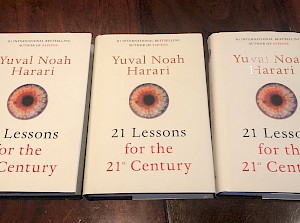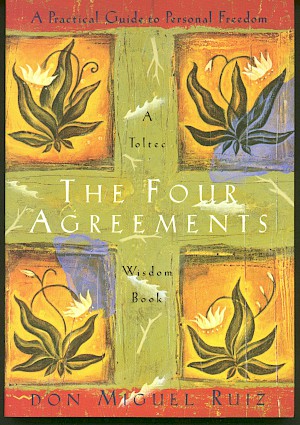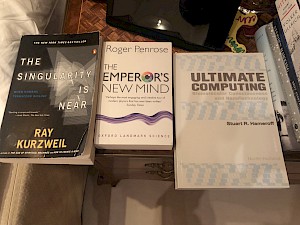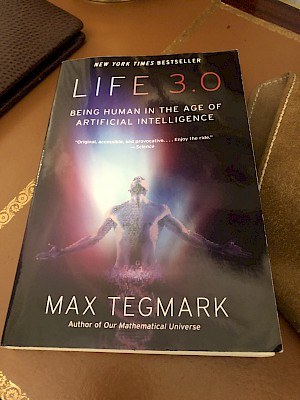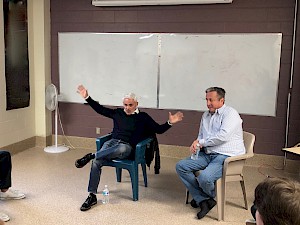Tell to Win
November 19, 2020A book review (and one doozie of a story)
How can one of the most horrible experiences in your life turn out to be the best thing that ever happened to you? I have such a story.
It was the late 1990’s and I was fighting for my life, trying to keep my nascent film company, Lionsgate Entertainment from going under. I had launched the company in 1997, seemingly out of nowhere, with much fanfare as the next big Hollywood studio.
Then I spent the next three years trying to stay afloat.
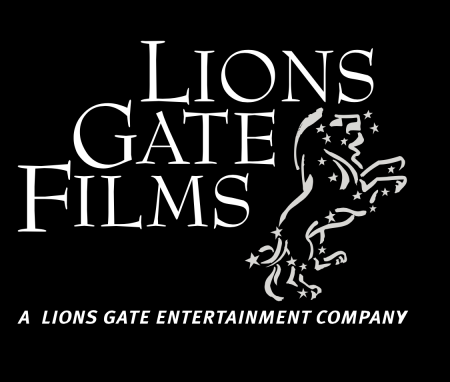 Lionsgate was created through a number of hurried acquisitions of smaller companies and one strategic partnership. That partnership was with Peter Guber’s Mandalay Entertainment. The terms of the deal put Lionsgate on the hook for more money than the original $50 million we invested on signing. Big mistake. And it wasn’t long until that mistake caught up with me and I was having trouble paying the bills, including a $25 million payment to Guber’s company. Peter was a gentleman but also a tough businessman. He was pressing me for payment and I simply didn’t have the cash.
Lionsgate was created through a number of hurried acquisitions of smaller companies and one strategic partnership. That partnership was with Peter Guber’s Mandalay Entertainment. The terms of the deal put Lionsgate on the hook for more money than the original $50 million we invested on signing. Big mistake. And it wasn’t long until that mistake caught up with me and I was having trouble paying the bills, including a $25 million payment to Guber’s company. Peter was a gentleman but also a tough businessman. He was pressing me for payment and I simply didn’t have the cash.
We argued back and forth about who was to blame for the predicament we were in. And we both had valid points. I took the position that he hadn’t delivered films from our slate in a timely manner and he countered that without the additional money, he couldn’t commit to green lighting more films. I was vigorously arguing my position, only because I had no other choice. But the truth of the matter was that he had more power, simply because he got the better of me when we did the original deal. It was my own fault and I knew it. I had let my ego and hubris lead my decision making and now I was in a real pickle.
Peter had been pushing me for months to come up with the money and was ready to pull the plug. He had every right to force me into liquidating our other assets, which would have effectively put Lionsgate into Chapter 11 bankruptcy. Our two sides had been negotiating on our respective behalf’s and there was no solution in sight. It was now time for Peter and me to have the dreaded one-on-one conversation. The future of my company hung on the balance of one phone call.
I was alone in my room at the Peninsula Hotel in Beverly Hills, nervously waiting when the phone rang. I let it ring three times before picking up. Peter’s tone was somber, not his usual exuberant self. He asked me one more time if I would sell the company’s other assets to pay him the money I owed. Since it would spell the end of Lionsgate, I told him no. That’s when he used a phrase I had never heard before: “It’s Chicago!” There was an awkward silence as I racked my brain trying to understand what he was saying. He continued, “This is where I get off”. I guessed it was a Hollywood saying meaning he was going to pull the plug on me.
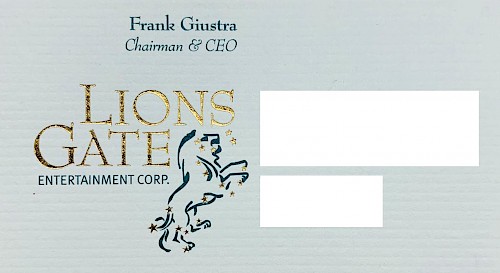 There’s a great scene in the movie The Deer Hunter, where Robert DeNiro’s character is being forced to play Russian roulette by his Vietcong captors. He was in an impossible position and simply had no choice but to put the gun to his own head. Knowing he had nothing to lose, he began laughing hysterically long enough to distract his captors and turn the gun on them. An old business partner of mine once told me, ”sometimes you have to appear crazier than the other guy”. That’s the approach I took on that call with Peter. I knew I was playing poker with only a pair of deuces in my hand, but a bluff was the only play I had left. My reply to his ultimatum was “Go ahead, put me out of business. It will be on your conscience.” I was betting on this adversity to bad publicity. Whether he deserved it or not, he had already taken a lot of heat a few years prior for poor performance when running Sony Pictures Corp.
There’s a great scene in the movie The Deer Hunter, where Robert DeNiro’s character is being forced to play Russian roulette by his Vietcong captors. He was in an impossible position and simply had no choice but to put the gun to his own head. Knowing he had nothing to lose, he began laughing hysterically long enough to distract his captors and turn the gun on them. An old business partner of mine once told me, ”sometimes you have to appear crazier than the other guy”. That’s the approach I took on that call with Peter. I knew I was playing poker with only a pair of deuces in my hand, but a bluff was the only play I had left. My reply to his ultimatum was “Go ahead, put me out of business. It will be on your conscience.” I was betting on this adversity to bad publicity. Whether he deserved it or not, he had already taken a lot of heat a few years prior for poor performance when running Sony Pictures Corp.
We finished the call unresolved, but with the threat still hanging over my head. I anxiously waited several days for a formal legal notice of his claim. Miraculously, his people came back with an offer that was very workable. He had backed off, as I had hoped and prayed he would. Our settlement paved the way and allowed Lionsgate to hire great management and grow its core business of producing and distributing the smaller, edgier non-mainstream films that made our company a huge success in the early days. Today, Lionsgate is a major entertainment company employing 3500 people with revenues of $3.5 billion.
I learned a lot about myself through that one experience. It was humbling, to say the least. I had let my ego make my business decisions by trying to do too much too quickly, biting off way more than I could chew. It caused me three years of immense stress. But, I also learned a lot about perseverance. I never gave up, even when many of the people closest to me were urging me to just walk away from the business. Those lessons served me well when building a number of other future businesses that truly outperformed. Have patience and perseverance has been my mantra ever since.
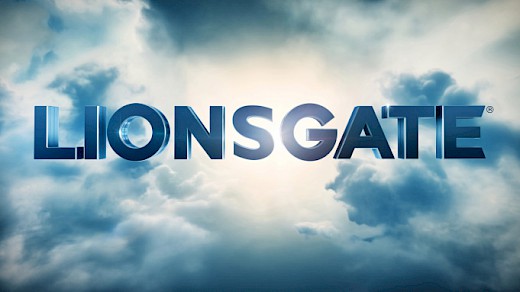 So, dear reader, do you see what I just did in the above paragraphs? I told you a story. A true story about a deep personal experience. But more importantly, through my story, I transported you emotionally into my inner world and kept you interested long enough to deliver my message about an important life lesson that helped me succeed in business. Which brings me to my book review. It just so happens that Peter Guber is also the author of a great book, “Tell to Win”.
So, dear reader, do you see what I just did in the above paragraphs? I told you a story. A true story about a deep personal experience. But more importantly, through my story, I transported you emotionally into my inner world and kept you interested long enough to deliver my message about an important life lesson that helped me succeed in business. Which brings me to my book review. It just so happens that Peter Guber is also the author of a great book, “Tell to Win”.
Guber is Chairman and CEO of Mandalay Entertainment and he is successful at many things. A film producer, business executive, educator and author, his most recent films include The Kids Are All Right, Soul Surfer and Bernie. He also produced Rain Man, Batman, The Color Purple, Midnight Express, Gorillas in the Mist, The Witches of Eastwick, Missing, and Flashdance. Guber's films have grossed over $3 billion worldwide and received 50 Academy Award nominations. He is also one of the greatest salesman I have ever met and I have great respect for him. Even after our difficult experience with Lionsgate, we remain friendly.
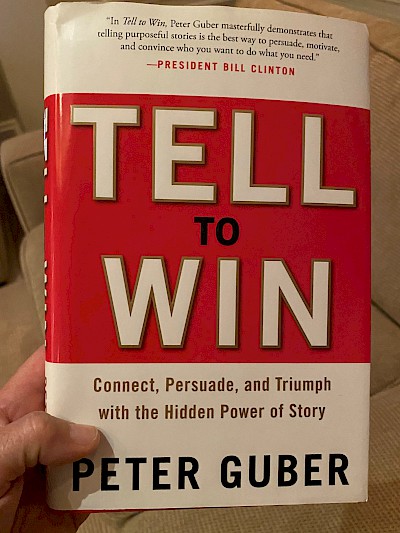 I recently re read his book and have recommended it to many of my friends, associates and even the teenage boys I mentor.
I recently re read his book and have recommended it to many of my friends, associates and even the teenage boys I mentor.
The book takes us through many real life examples of how by using story telling techniques you can engage your audience. This technique is far more effective than bombarding people with facts and figures. Guber demonstrates how to succeed at winning people over by creating compelling stories that have the power to move people to your call to action in any circumstance, whether they are partners, shareholders, customers or employees. Simply put, if you can’t tell it, you can’t sell it. And this book tells you how to do both.
Guber lays out the approach to setting up and delivering your story, keeping in mind it must be a call to action of sorts. First, craft your beginning to shine the light on your challenge or problem. Then, shape the middle to meet that challenge, usually describing some type of struggle. End with a resolution that ignites in the listener your call to action. If you tell your story well, your audience doesn’t realize it’s receiving a hidden message. Having been a story teller myself, I can attest to the fact that it’s a method that works. In fact, even before reading “Tell to Win“ I used the Lionsgate/Guber story when we were launching Thunderbird Entertainment a few years back. By describing the near disaster that might have been, I told my backers how much I had learned of the things not to do when building a film company. The best lessons come from the mistakes you make in life, not from the successes. In my pitch, this is where I had knit the call to action.
One important lesson I have learned in life that Guber’s book also endorses is to not be afraid to be truthful and vulnerable when telling your story. You are the hero of your story but you are also human. It’s ok to fail now and then. Everyone can relate to vulnerability and if people can relate to your story, they will be more likely to buy into your vision.
“The heart is ALWAYS the first target in storytelling“.
Peter Guber




